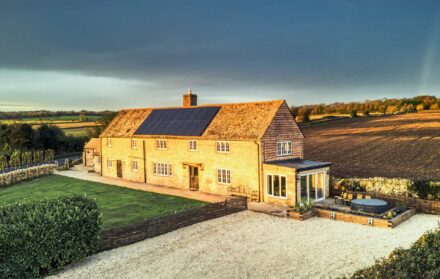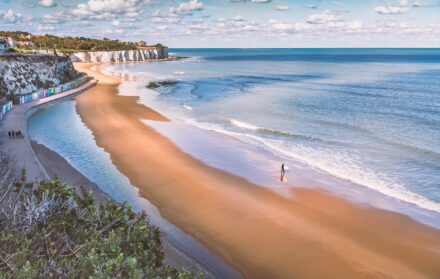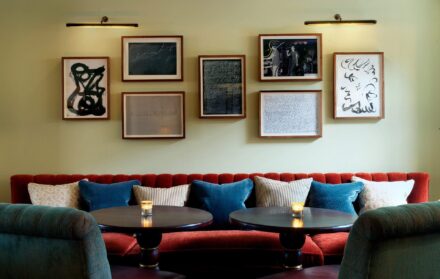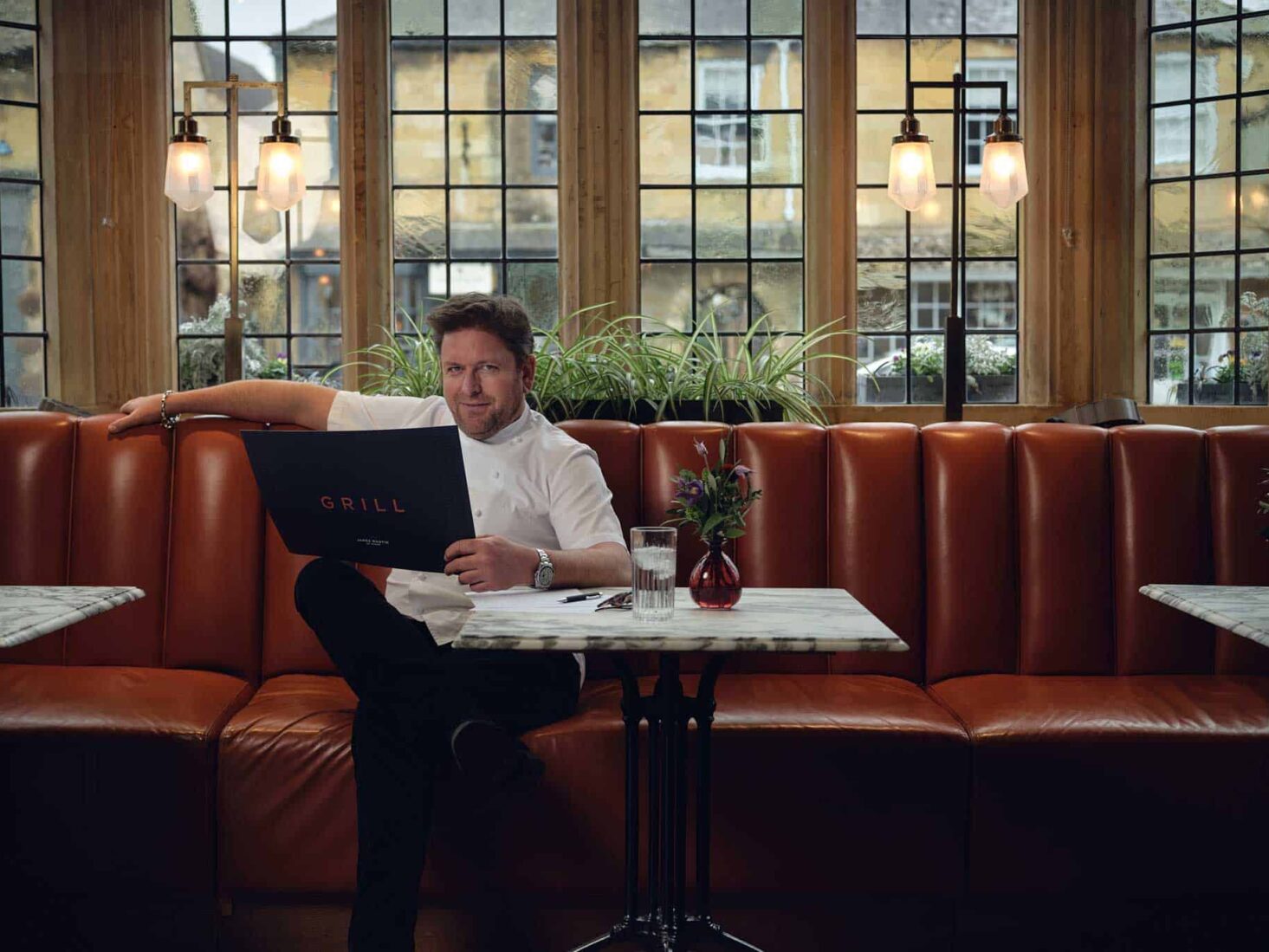
James Martin on his new Cotswold restaurant, TV career and the future of hospitality
The celebrity chef’s latest culinary project has taken him to The Lygon Arms, where he has opened two new restaurants and drawn quite the crowd
James Martin is roughly 15 minutes late for our interview. As I wait for him to arrive in a beamed-ceiling, Cotswold stone-clad room of The Lygon Arms — where he’s just finished transforming the culinary offerings of this historic inn — I look out onto Broadway, often referred to as ‘the jewel of the Cotswolds’.
Lined with quaint shops housed in golden-hued cottages, at the centre of the village is The Lygon Arms, which is just over an hour from London and boasts a rich history, warm welcome, plush bedrooms and, of course, a new chef with his name above the door. Before long, Martin walks in wearing his chef whites (not a stain on them, may I add) and apologises profusely. “Sorry for being late,” he says. “It took me 15 minutes to get from the restaurant to here as I was chatting to customers.”
It’s unsurprising given his celebrity chef status. Martin first appeared on our TV screens 30 years ago as “a young twenty-something hotshot” and is now one of the most famous chefs in the country. Having opened restaurants across the UK (he now runs an eponymous outpost in Manchester, The Kitchen at Chewton Glen in Hampshire – where he also lectures at the cooking school – and the Tavern and Grill at The Lygon Arms), Martin is also the author of over 20 cookbooks and fronts a popular Saturday morning TV show.
At 50, he shows no signs of slowing down and food remains his first love. “I got it from my grandparents, they were tenant farmers and loved growing their own food. From the taste of that first tomato to pulling potatoes out of the ground, [working with food] is all I’ve ever wanted to do,” he says.
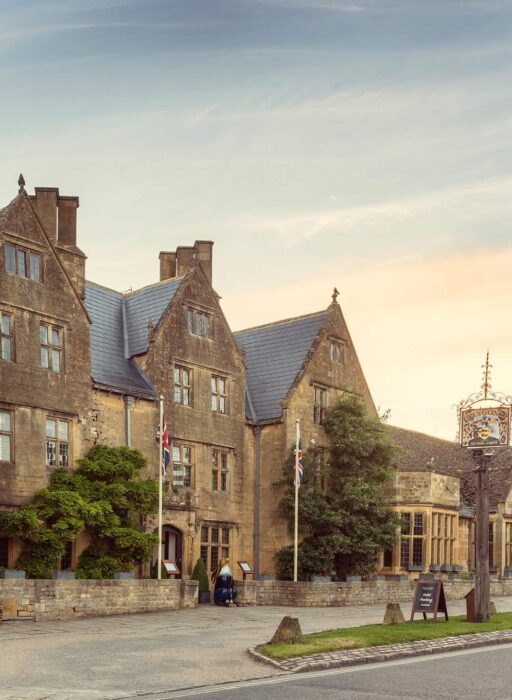
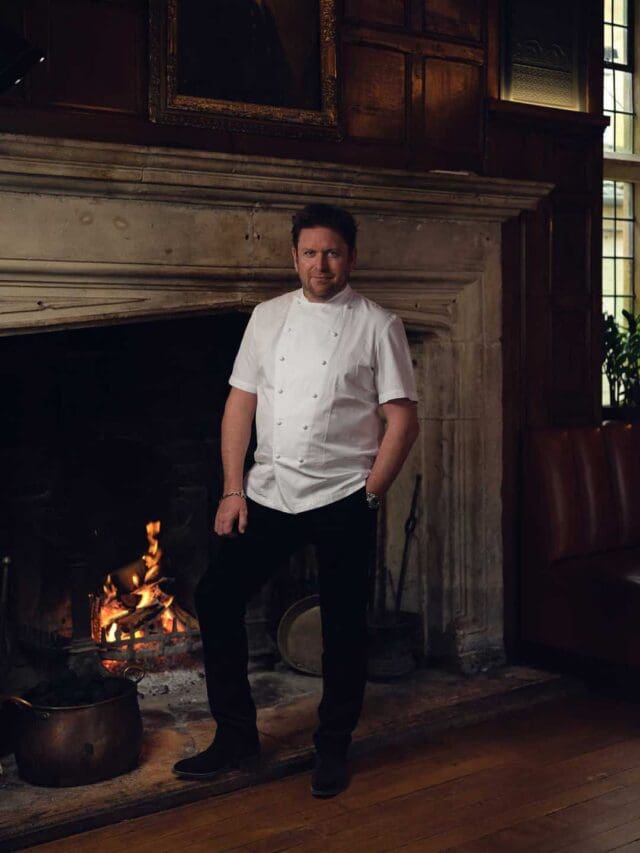
Thanks to family connections, Martin first landed in a kitchen as a pot washer at the age of 11, got his first chef’s jacket and knives at 12 and started working in Michelin-star restaurants at 14. “I left college on the Friday and started working in London on the Monday,” says Martin. “There was never going to be a gap year, my family had no money to do any of that. I quickly learnt the only way you’ll do anything is if you go out and work for it.”
At 21, Martin became the head chef at the Hotel and Bistro du Vin in Winchester which attracted a steady London crowd and other high-flying chefs from across the country. “The minute we opened the door, it almost became the place to go. We were fully booked and you couldn’t get a table for months. I was only a kid,” explains Martin.
“It was everything I wanted it to be at the time but it was madness. Word got around that I was a young 21-year-old with a bandana on and I was making a bit of a storm in Winchester. I got a call for a TV interview but didn’t think much of it. I was living above a Chinese restaurant paying £60 a week rent, and then my life changed very, very quickly.”
Martin started working in TV in 1996 but is best known for presenting the BBC’s Saturday Kitchen from 2006 to 2016, before leaving for ITV the following year. “Television goes through fashion and trends, you have to evolve and change. I’m different to who I was 30 years ago, even to who I was 10 years ago. 30 years in television is a long time when you’ve been told what to do. It was my decision to leave the BBC and the Saturday show — it was a huge show which we built it up — but it comes down to what feels right for you and whether you enjoy it.
“You should always have your own point of view and don’t be afraid to stand up [for it]. And that, in terms of the media, can get you into all manner of problems. People at home are not daft. They followed me on that journey for 30 years. It’s tempting to follow trends and write a book on healthy food, but it’s not me. When everybody was writing about healthy food and one-pan wonders, I wrote a book on butter.”
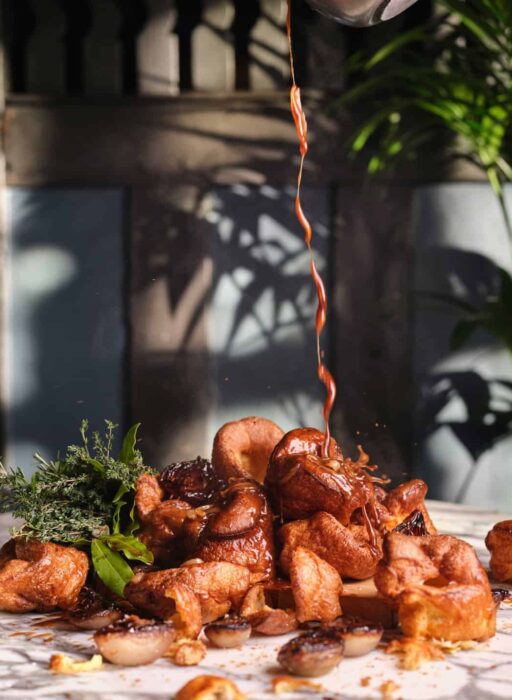

So, what drew him to The Lygon Arms? Did he need to add another restaurant to his roster when he already spends only a couple of days at his home in Winchester every few weeks and sleeps roughly five hours per night? Well, probably not, but for Martin it’s not about need, it’s simply about want.
“We had been talking about [The Lygon Arms] for two or three years,” he says. “I was not ready for it, I needed a good second guy with me and I have that now. I was only going to do this if our team was going to do this. The Lygon Arms has so much history but we can’t learn to run before we can walk.”
Steeped in a 600-year history, The Lygon Arms was originally a coaching inn but has been reinvented as a four-star hotel. In the 17th century, it became a bolthole for King Charles I during the English Civil War (the hotel pays homage to this with a namesake suite) while Oliver Cromwell also trod its slate floors before the Battle of Worcester in 1651.
Royal visitors have included King Edward VII, who first visited in 1905, and again in 1913, and his young grandson and future king, Edward VIII, who abdicated in 1936 in order to marry American divorcee Wallis Simpson. More recently, it provided a romantic haven for Elizabeth Taylor and Richard Burton during the height of their scandalous affair in 1963 (don’t miss the commemorative Taylor-Burton affair cocktail on the bar menu).
But its past also means “it’s listed to hell”, as Martin succinctly puts it, so he was faced with quite the renovation when revamping the hotel’s decades-old kitchen. “It’s unlike any other business I’ve worked with. You have to deal with the perimeters you’ve got: the walls are wonky and you can’t just knock a wall down and gain an extra power [socket] for that oven. You’re so limited to what you've got. It’s an interesting but great challenge.”
Compared to his other two restaurants, The Lygon offers a more relaxed, informal dining space where Martin hopes to exemplify his farm-to-table ethos. “The Lygon tried Michelin star dining; it’s not worked. They’ve tried real fine dining; it’s not worked. And they’ve gone the opposite way; it’s not worked. All we can do is create stability with quality ingredients and great, simple cooking.
"You can’t promise something and not deliver it. We’re limited to a building that’s been here long before I was born and will be here long after I’ve gone — I can’t even take a bit of wood off."
James Martin
“Our ethos, as we approach the summer, is really where we bring out my kind of menu. I’ve got a great fish supplier in Cornwall and a great meat supplier in Yorkshire and local butchers. I believe in supporting farmers and helping other businesses in the local community,” he says, pointing across the road to a small fruit and veg shop. “The first thing I did when I took over this place was walk over and shake his hand.”
In February and March this year, Martin and his team overhauled both The Tavern — the hotel’s adjacent pub serving light bites and sharing food, best enjoyed with a local Hawkstone lager — and The Grill, a shiny oak dining hall adorned with classical paintings and deer antlers offering seasonal classics such as spring lamb shank, dry-aged chateaubriand and, one of Martin’s favourites, the market fish of the day which is simply grilled with lemon.
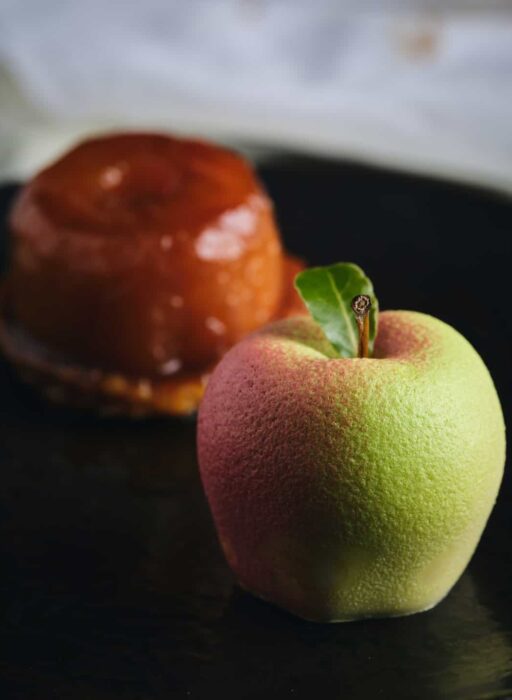
The Kitchen Apple Tart
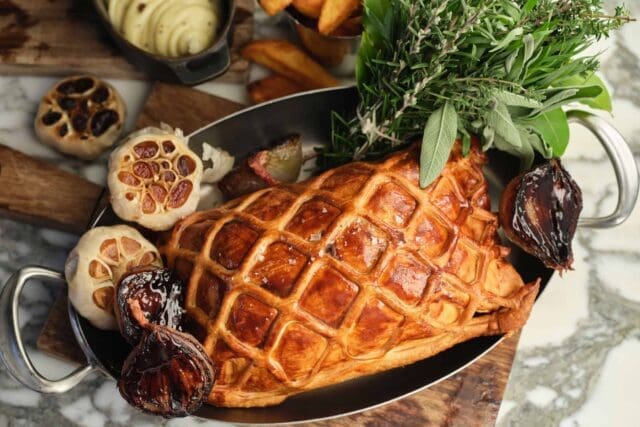
Dry-aged Longhorn beef Wellington
“The kitchen in the Tavern is about the size of a postage stamp. There’s only room for one person in there with a fryer, a reheating oven and a fridge. We’re not doing starters, desserts or side orders; there are five plates [to choose from] like a beautiful pork pie from a local butcher and baked Cotswold cheese in a loaf of bread. The Grill is the dining room, but you can have the same menu throughout the hotel. There’s no set place to dine here, it’s very relaxed and that's how the menu has got to be.
“You can’t promise something and not deliver it. We’re limited to a building that’s been here long before I was born and will be here long after I’ve gone — and I can’t even take that bit of wood off,” he laughs, pointing to the wall behind me.
Splitting his time between three restaurants is challenging in itself, but Martin admits the hospitality industry is only getting tougher. “You’d hope when you get to 50 it would start to become a bit easier, but it’s still hard work. However, it’s not hard work compared to a lamb farmer, for example. I have total respect for people who produce food; they work ten times harder than chefs. It’s our job to support these guys.
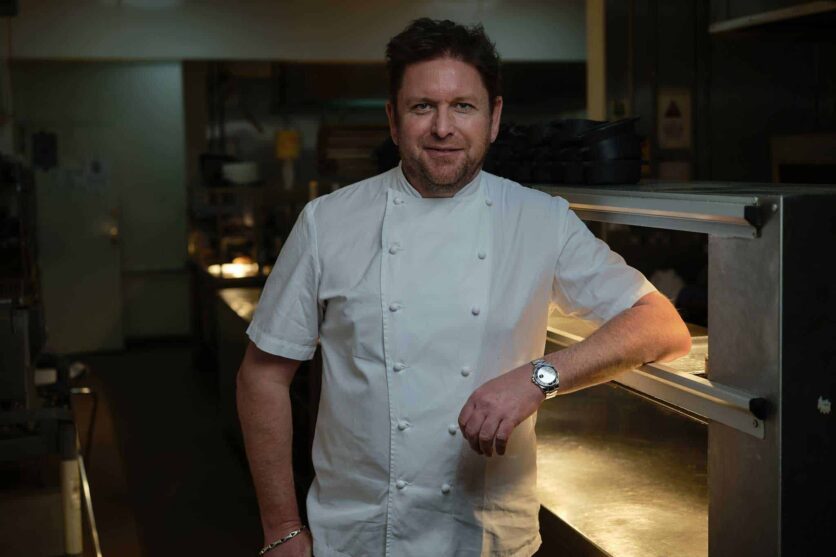
“In hospitality, you’re a victim of so many things you can’t control. I can’t dictate the price of grain when there’s a war in Ukraine and it’s costing the farmer more, so my meat prices have gone through the roof.
“We realise how fragile it is, there are 10 pubs a week going under. My friend’s energy bill, who runs a small 60-seat restaurant in London, has gone from £8,000 per year to £120,000 just like that. London scares the hell out of me. It’s very transient and people will leave for an extra 10p.”
So, what are his ambitions for 2023? From what I can gather from our 45-minute interview, it’s to continue cooking good food, looking after his team and enjoying his job.
“When I’m here [at The Lygon], I‘m meant to be in the kitchen but customers always want to chat. But it’s good and it has a great buzz — it feels like I’m 21 again. I love it.”
Visit lygonarmshotel.co.uk
Read more: Meet the chef: Adam Smith of Woven at Coworth Park



